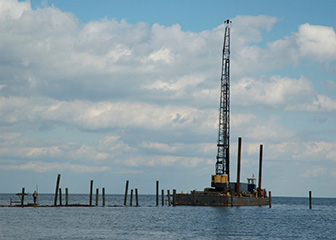Summary
Please enable javascript to play this video.
| Quick Facts: Construction Equipment Operators | |
|---|---|
|
$51,050 per year
$24.54 per hour |
|
| High school diploma or equivalent | |
| None | |
| Moderate-term on-the-job training | |
| 483,300 | |
| 3% (As fast as average) | |
| 13,300 | |
What Construction Equipment Operators Do
Construction equipment operators drive, maneuver, or control the heavy machinery used to construct roads, buildings, and other structures.
Work Environment
Construction equipment operators may work even in unpleasant weather. Most operators work full time, and some have irregular work schedules that include nights.
How to Become a Construction Equipment Operator
Many workers learn how to operate construction equipment on the job after earning a high school diploma or equivalent; others learn through an apprenticeship or by attending vocational schools.
Pay
The median annual wage for construction equipment operators was $51,050 in May 2022.
Job Outlook
Overall employment of construction equipment operators is projected to grow 3 percent from 2022 to 2032, about as fast as the average for all occupations.
About 42,300 openings for construction equipment operators are projected each year, on average, over the decade. Many of those openings are expected to result from the need to replace workers who transfer to different occupations or exit the labor force, such as to retire.
State & Area Data
Explore resources for employment and wages by state and area for construction equipment operators.
Similar Occupations
Compare the job duties, education, job growth, and pay of construction equipment operators with similar occupations.
More Information, Including Links to O*NET
Learn more about construction equipment operators by visiting additional resources, including O*NET, a source on key characteristics of workers and occupations.
 United States Department of Labor
United States Department of Labor






